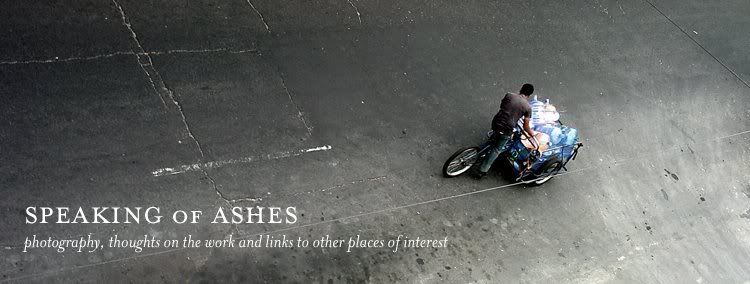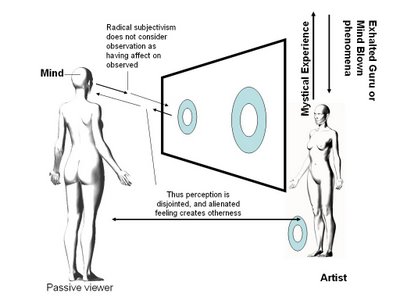Following up on the last thing I wrote, this is another part of a correspondence I've been involved in lately.
If i gather what you are asking, and try to ball up some kind of an answer, which is what I am doing... I will say it this way...
At some point in my meditation studies I realized that the actual energy I was manipulating if such a word is not too strong, in fact it is, ... the energy I was training myself to be aware of and observant of was identical to, and in fact was/is that very energy that so frightened and bewildered me as a child. A shrink would call my childhood experiences "night terrors" but I believe an African, at least some of those from the west of Africa (among the few I've read) would say I was still rather fresh from the land of ancestors, and thus blessed with their particular insight and mental energy.
They would also say that those most senior amongst us get crazy and insightful as, late in life, we all approach the same territory. This kind of awareness, unfortunately, lies dormant for most of our lives, but of course we glimpse it, or it calls to us in our dreams and we can only, frustratingly, appeal to it, to this awareness, in the most passive of stances.
By passive, of course, I don't mean laying down or doing nothing, but maybe listening is the best verb to try to use. When I read your message to me now, I snap to attention and my talking voice starts coming out and I must say my talking voice is not at all different from what I also could call my listening voice.
This is to say that were we leaning over two cervezas and talking I don't doubt that the both of us would listen exactly so that we could respond with the smartest or most clever answer, a mental state not at all different from talking. It is listening to hear what we want to hear and I believe this is the state of talking, of action, and not a state of passive receptivity.
The easiest illustration of listening is of course when you happen to walk into a room where any old painting by van gogh or rembrandt happens to be hanging. Of course, a crowd of the dazed tourists we normally avoid are there and you will see that of course now we can't help but move in closer to them. This is because when we witness such graceful and even brutal applications of paint we are forced out of this same voicey-talking head space and into a level of where we are so enraptured by what we see that we aren't anymore expecting to come up with a clever thing to say in response.
We might liken some of that experience to actually listening. To being calm enough that something inside is moving and we can become aware of what it wants. Listening is being able to discern motive and not only the enunciation of a given grammar, and that ancestral level of awareness speaks to us in conscious life at a level the perception of which requires a pristine patience and passivity and even compassion. Maybe that word "ancestral" sounds a bit bugaboo. I only know that I can dream things that I am unable to imagine and from that I conclude that the most powerful imaginative faculty I possess is not to be controlled or coaxed actively. If it wants to be boss, I believe I have gained from allowing it to be.
More to the point, it is our perspective that dismisses patience and understanding and quiet calm. I try to see the obsessive quality of rembrandts and van goghs in people of course. That is not so difficult, but finding it in rocks and buildings and trees requires us to learn how our bodies are in relation to these things that we label external. Understanding them as part of ourselves, I guess, requires an abolition of the concept of self that I am probably not ready to commit to. I'm not even able to, and perhaps that is just dying.
But I like to find things again that make me remember how terrifying things were when I was a kid. Something that glowed green or blue was more frightening than something that glowed red. And somethings glowed even when they weren't luminous, some things vibrated and the awareness that I could perceive this only because I was vibrating too was enough to send very powerful chills through me. Today I think those small things were there to remind me, NOW, that I have work to do deciphering what they wanted. These, to me, were ancestors who knew I would remember almost 40 years later and try to speak for them.
Of course, they don't need patience because they haven't got time. So I suppose i am driven by an obsessive compulsion to understand why I found a christmas bulb in the dirt, and 3 and a half decades later, the vision of it is as clear to me as its glassy cool mystery was in my hand then. It is like Borges' aleph, some kind of communion in which I see so much that the me seeing is lost too. Or nearly, I would like to imagine. When I remember the bag of shamanic article dumped on the table in the book by the African, they are similar. Mundane articles, a dried paint tube, a stone and a piece of rag. We have to be sure we are putting the best of ourselves into these things when we try to understand them. And that will be understanding.
I guess that is all I try to do. Set up situations where a message gets through.
Let me know your thoughts.
 Everyone I know is still haunted by this character from art-school.
Everyone I know is still haunted by this character from art-school.








 I mean really. It's a bit boring. Whenever I go to Venice I like to learn about Venice for the Museum it is, and that it can hardly improve upon. Then I think of this Biennale thing as sort of a bulk message folder and I say "Yes, I am sure I would like to delete all of it, thanks," and I go back to pondering what combination of sun and sand and salt can make the sea such a brilliant color. Doubtless there will be more than one artist there who could impress me, but they would well do the same thing in a cafe in Arkansas, where the environment and the psychology is doubtless in more need of attention.
I mean really. It's a bit boring. Whenever I go to Venice I like to learn about Venice for the Museum it is, and that it can hardly improve upon. Then I think of this Biennale thing as sort of a bulk message folder and I say "Yes, I am sure I would like to delete all of it, thanks," and I go back to pondering what combination of sun and sand and salt can make the sea such a brilliant color. Doubtless there will be more than one artist there who could impress me, but they would well do the same thing in a cafe in Arkansas, where the environment and the psychology is doubtless in more need of attention.



